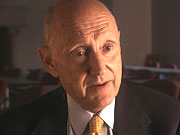![[photo: man sailing]](img/retirerev/photo_vertical_sail.jpg)
Diversify Your Investments
Advice from experts on using cash, bonds, stock, real estate, mutual funds, indexes and foreign investments to grow your nest egg.
 Setting a Realistic Retirement Plan
Setting a Realistic Retirement Plan
Ken Little
What's the best way to prepare for financial security in retirement?
Begin with a savings plan. Ideally that would start with your first job as a young person. We don't always do what our parents tell us is the best thing to do, but the first step is a savings plan, and if you work for a company that has a savings plan like a 401(k), sign up and contribute as much as you can. If you work for a company that doesn't have a 401(k) plan or you are self-employed, get a savings plan started, an IRA, or a typical savings plan. The important thing is to get into the savings habit. Pay yourself first is the old cliché, but it is important and it is correct.
What specific steps should a young person take as they begin to save?
The first thing you are going to do is build up an emergency cash fund so that you have enough cash on hand to take care of an emergency that should come up. For instance, you lose your job, have a medical problem, etc. Three to six months of cash on hand to cover your living expenses. That money should be in a money market fund, a CD, bank account or something that you can get to. Then, you can start working on building an investment account. I would recommend people start off with a simple account such as a stock index fund that they can contribute to on a monthly basis. As they get more knowledgeable about investing in the stock market, there are plenty of resources on the Internet. Then they can start investing in individual stocks. If they feel they need a stockbroker, they can find those. But start off slow and do it on a regular contribution basis.
Assuming you have enough cash on hand to cover your emergencies and your everyday needs and you have some investible cash, you can open an account with a stock mutual fund. They will set you up so that your checking account can be debited every month for $25, $50 or $100 a month to go into that account, and that is one of the better ways for someone to invest in a mutual fund. You are buying shares in the mutual fund on a regular basis, so that when the fund is high, you are buying fewer shares, and when it is low, you are buying more shares. The concept is called dollar cost averaging, and it is one of the best ways for the average investor to get going.
Is investing in the market risky?
Investing always carries a certain amount of risk. People need to be aware of that. When you invest, say, in an index fund which matches one of the standard stock indexes like the S & P 500, you are betting that the market is going to do what it has historically done, which is – depending upon how you want to measure the results – 10-12% return over a long period of time. It has taken some bad falls in the past, but over a long period of time, the average says you are going to do okay.
 Mutual Funds and Why They're Popular
Mutual Funds and Why They're Popular
Mellody Hobson
What are mutual funds, and why are they so popular?
A mutual fund is a basket of stocks or a basket of bonds or stocks and bonds together. Or any type of investment. The great thing about a mutual fund is that you get diversification. So let's say a fund has about 30 stocks in it and the good news there is that if one day one stock goes up but another goes down, they balance each other out and you haven't put all of your eggs in one basket.
The other thing that's great about a mutual fund is that you get a professional managing it for you. So you don't have to know or think about what's a good stock to invest, when you should buy it, when you should sell it, how to follow all the news on the company. You have other people doing that for you as a full-time job. Additionally, they generally do it for a low cost. So if you invested $1,000 with a 1% manager's fee, you basically are paying $10 for the year for them to manage your account. That's a really good deal and that's why mutual funds have been so popular.
Last but not least, the great thing about mutual funds is they're very simple to own. By that I mean that all the tax work is prepared so you're not hunting down pieces of paper. You get regular statements every quarter. If you make an additional investment you get a confirmation, so it's very, very simple in terms of the overall management. And you always have access to your money. Now, that doesn't guarantee a return, but it means that within 24 hours of calling, your money will be sent to you.
What is the difference between stocks and bonds?
If you had a friend and they were raising $100,000 to open up a restaurant and they asked you to invest $10,000 in the restaurant and you'd own 10% equity in that company. Let's say the restaurant opened up and it was extraordinarily successful. You would get 1/10th of all of those profits after the waiters, waitresses and everyone got paid. You'd be happy as a clam. You would have equity in the company as you do when you purchase stock in a company, but you would be taking a risk on whether or not the company would make money.
That's different than a bond where your friend comes to you and says they want to start a restaurant and they'd like you to lend them $10,000. When you loan people money, you expect to get paid back. Let's just say for some crazy reason the restaurant opens and the first day the health inspectors come and close it. The one thing you would expect after your friend sells all the appliances, the furniture, is that you would get paid back because you didn't take the risk of an investment. And so the difference between stocks and bonds is that with bonds, the odds are less risky because in the event or bankruptcy or any kind of trouble, bond holders get paid first because they were only lending the money. Stock holders take the business risk, the ups and downs, and if it doesn't work out, they may lose everything. But if it works out, they get wonderful recurring revenue.
 Indexes: Are they the Best and Lowest Cost Investment Product?
Indexes: Are they the Best and Lowest Cost Investment Product?
Burton Malkiel
How do index funds compare to the performance and movement of other investments?
I have been an advocate of index funds from even before index funds even existed. If there is one thing that I am certain about in investing, it is that the lower the fees you pay to the purveyors of investment products, the more money will be in your pocket rather than in the pocket of the seller of the investment product. The best and lowest cost investment product is what is called an index fund. An index fund simply buys and holds all of the stocks in a market, or all of the bonds in a market. There are stock index funds and bond index funds. There are index funds for the United States, index funds for Europe, index funds for China and for emerging markets in general.
The beauty of these funds is that the expense ratios – what the purveyor gets as opposed to what's in it for you – are rock bottom. All of the statistical work that I have done throughout my life suggests that year after year, index funds outperform, give a higher net rate of return to the investor than the average high expense actively managed fund, which is what most mutual funds are.
Each year the index fund beats about two-thirds of the actively managed funds because the five that win in one year aren't the same five that win the next year, so that when you compound this over 10, 20, 30 years, you find that you can really count on the fingers of your hands the number of actively managed funds that have beaten the index. So indexing is not guaranteed mediocrity as some critics will call it, but actually one of the surest ways that the individual investor can get above average returns.
The expenses are low because you are not paying people to analyze and manage what is in the fund. What about transaction costs?
The expenses are low in an index fund for two reasons. One, you don't hire a bevy of security analysts to go out and interview each company and try to do the research to decide is Dow Chemical is better than DuPont, or if Ford is better than General Motors. You don't have that expense. Also, the typical actively managed mutual fund turns the portfolio over every year. That is to say, there is 100% turnover. They tend to hold stocks for one year and then switch them into other stocks. That turnover is expensive. There are brokerage costs and middleman spreads, even on very liquid stocks there are so-called market impact costs. Not only are the explicit expenses lower for an index fund, but the transaction costs are much lower, and that is why index funds are not average performers, they are well above average.
 International Investing
International Investing
Jeremy Siegel
When the Baby Boomers sell off their assets, will they be purchased by foreign investors, or will those assets decrease in value?
My research shows that if we do not open up our world capital markets to foreign investors, particularly investors from emerging nations, we are going to have a big problem, because there aren't enough people to buy all those assets just within Western Europe, Japan, the United States and Canada, which we call the developed world. If we close our borders to foreign investment, we could have a very severe bear market the next 20 years. Yes, it really could lead to prices being far lower than today. My research also shows that if we keep our markets open to the rest of the world, the number of new wealth buyers in China and Indiana, the emerging countries will support our equity markets and keep them vibrant. So it becomes a very, very critical question.
Do you support foreign investing?
Yes. There is a world index called the EAFE which is Europe, Australia and the Far East. Think of starting on a diversified world index. It may mean selling some of your U.S.-based stock and moving to internationally based stock, and to the extent that you have it in your 401(k) or your tax-sheltered program, you don't have to worry about taxes when you make that shift. If you do have it in your personal accounts and you have gains on it, you will have to pay a 15% capital gains tax, but that is not very much. It might go up in the future depending on the needs of the government. Even then I would say if you need to sell some of your U.S. stocks to get internationally diversified and take a capital gain hit on that one in the long run it will pay off for you.
Priscilla Parke
Are international investments more expensive than investing in American companies?
If you buy a mutual fund that invests strictly on an international basis, it can be slightly more expensive from the standpoint of fees. Probably the reason for that is that they are not just investing with the money managers in the United States, they are probably located throughout the world. So it can be slightly more expensive but not prohibitive. If you buy an individual stock or an individual bond and it is internationally based, then no, it does not cost you more. We are becoming a global economy. You are going to find more and more of everyone's investment based on a worldwide basis. 20 years ago, no one was invested internationally, very few. People were invested in the United States, the rest of the world didn't exist. The investment growth in international over the next ten years is going to be incredible. We might not be the best rate of return in the world, there may be higher rates in other countries.
How can an investor tell whether a company is American or international?
Toyota is a Japanese company, but they produce many of their cars in the United States. Many of the parts are American as well. Their assembly plants are in America and they employ Americans. So it is not simple anymore to define whether a company is U.S. or international. We are becoming integrated and we are all going to be dependent upon one another. It's going to be all of us working together in a huge global economy.
How can a person hedge their savings against inflation and the dropping value of the dollar?
Every portfolio should have certain things that actually hedge against the dropping of the dollar, and that can be accomplished in different ways. Having international bonds in the portfolio is an example. Non-dollar denominated, that is a hedge against the dollar. Having investments overseas is a hedge against the dollar. Having a very small percentage of an asset that relates to gold in the portfolio is a good hedge against the dollar. As long as these are done in small amounts, not over-invested, but part of the plan, they can definitely help against any change in the value of the dollar.

Ken Little is the author of twelve books on investing and personal finance, including Teach Yourself Investing and The Idiot's Guide to Investing. He is the writer and editor of the Stocks web site on About.com, where he writes articles for beginning and intermediate investors. This is an edited transcript from an interview conducted on September 6, 2007.

Mellody Hobson is President of Ariel Capital Management, LLC – a Chicago-based mutual fund company and investment management firm that serves individual investors and 401(k) plans and manages separate accounts for institutional clients. She is a regular financial contributor on ABC's Good Morning America as well as a spokesperson for the annual Ariel/ Schwab Black Investor Survey, which examines the influences and investing habits of Black and White Americans. This is an edited transcript from an interview conducted on October 5, 2007.

Dr. Burton G. Malkiel, the Chemical Bank Chairman's Professor of Economics at Princeton University, is the author of the investment book, A Random Walk Down Wall Street. He holds B.A. and MBA degrees from Harvard and a Ph.D. degree from Princeton University. He began his career in the investment banking department of Smith Barney & Co. Dr. Malkiel has long held professorships in economics at Princeton, and was dean of the Yale School of Management. This is an edited transcript from an interview conducted on September 10, 2007.

Jeremy Siegel is the Russell E. Palmer Professor of Finance at the Wharton School of the University of Pennsylvania. He received his Ph.D. in Economics from the Massachusetts Institute of Technology. Prof. Siegel taught for four years at the Graduate School of Business of the University of Chicago before joining the Wharton faculty. He has written and lectured extensively about the economy and financial markets and appears frequently on CNN, CNBC, NPR and other networks. He is a regular columnist for Kiplinger's and Yahoo! Finance. Prof. Siegel served for 15 years as head of economics training at JP Morgan and is currently the academic director of the U.S. Securities Industry Institute. This is an edited transcript from an interview conducted on August 27, 2007.

Priscilla Parke is a Wealth Advisory Specialist at Smith Barney, a division of Citigroup Global Markets Inc. Her 25 years of experience in the financial industry has focused primarily on Retirement Planning. Ms. Parke is licensed in all areas of finance; Portfolio Management, Insurance, Commodities, and Series 7, and is an Investment Advisor and Financial Planning Specialist. This is an edited transcript from an interview conducted on September 21, 2007.
|
||||||||||||||


























